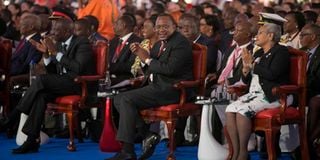Premium
A national reminder: Time to take stock of progress, gains in FGM war

President Uhuru Kenyatta, First Lady Margaret Kenyatta and Deputy President William Ruto during the official opening ceremony of the Nairobi Summit on International Conference on Population and Development (ICPD25) at KICC in 2019.
What you need to know:
- President Kenyatta has made substantial, weighty and far-reaching pledges on the issue of gender equality and equity.
- The civil society working in collaboration with the government, and the media, have gained much ground in combating FGM.
President Uhuru Kenyatta must be the most anxious political leader in Kenya at the moment. While those seeking to succeed him spend sleepless nights planning and strategising on how to out-manoeuvre their rivals to clinch the country’s top seat, the President is seemingly working round the clock to secure his legacy.
A positive legacy is, clearly, his top priority — never mind his desire to give direction on his preferred successor. This may explain why he has, on numerous occasions, taken to inspecting the key projects said to be ‘close to his heart’, even at night.
That he is eager to ensure that projects tied to his term are completed on time, ahead of his retirement, is not in dispute. This is evident in the manner that civil servants, including Cabinet ministers, are falling over themselves to ensure that his wishes are fulfilled and his promise to leave behind certain completed projects delivered.
Interestingly, a rush to ensure that pledges and commitments on gender matters — and they are many, important and significant — has not been as evident. Yet President Kenyatta is, arguably, Kenya’s only head of state who has — and notably so — made substantial, weighty and far-reaching pledges on the issue of gender equality and equity, including on gender-based violence, (GBV).
A global co-leader of Generation Equality’s Action Coalition to End GBV, he made some of those outstanding commitments from powerful and visible global platforms, drawing international acclaim as a dedicated advocate for gender equality, specifically on issues that negatively affect women and girls.
For instance, it was at the global Women Deliver Conference, in Vancouver, Canada, in June 2019 that he announced his government’s firm decision and pledge to stamp out the regressive practice that is female genital mutilation/cutting (FGM/C) by the end of this year, well ahead of the 2030 target set by the international community.
He followed this pledge through by convening, at State House, Nairobi, a meeting of elders from communities where the abhorrent practice is prevalent. They would sign a commitment to ensure that the President’s promise to end female circumcision is realised.
Combating FGM
That was November 8, 2019. Two weeks later, at the High-Level Nairobi Summit of the International Conference on Population and Development at (ICPD+25), he was, once again, categorical that, in addition to enforcing the Prohibition of FGM Ac 2011 and related laws, perpetrators of FGM/C and their collaborators, like family members who subject girls to the heinous vice, would be punished.
The message that he was driving home was that the government would, besides devising new strategies to combat FGM/C, given that perpetrators and their associates relentlessly side-step and overlook the law and other legislative measures to subject girls to the practice, leaving ruined young lives in their wake.
While this tough stance has since received an enormous measure of success, perpetrators and collaborators went underground only to ‘innovate’ and ensure that their criminal ways remain alive. However, huge strides have been made through campaigns.
Stakeholders, mostly the civil society working in collaboration with the government, and the media, have gained much ground in combating FGM/C. They employ strategies and tactics that include working with the communities to ensure success.
In the countdown to the end of FGM/C, the country should take stock of the achievements so far made and progress in this war, which will also serve as a national reminder of what must be done to end this gross violation of the human rights of girls and women.
And what a better time to focus on the target than now, when the global community observes the International Day of Zero Tolerance for Female Genital Mutilation, on February 6. Leaders, especially from communities where the vice is prevalent, especially politicians seeking elective seats in the August general election, must use their platforms to campaign against it. The voters also need to demand the same of the aspirants.
Ms Rugene is a consulting editor and founder, The Woman’s Newsroom Foundation. [email protected]





